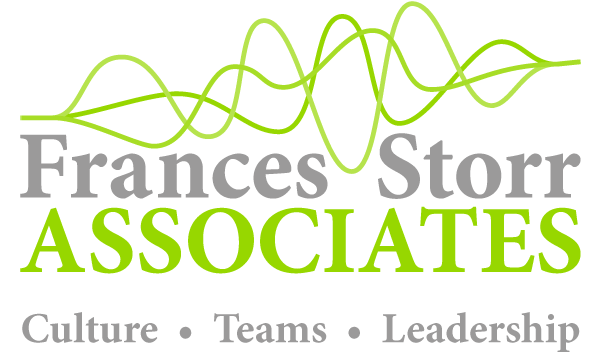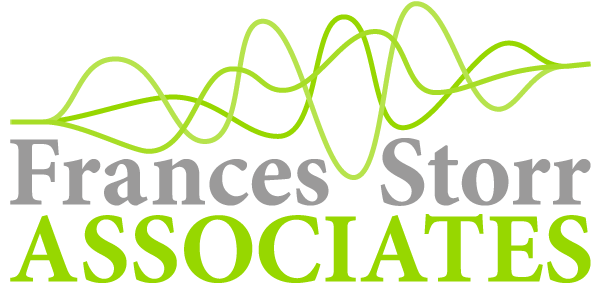 Her style is very human and involving rather than clinical and staying on the surface like a lot of business consultants. Frances doesn’t try to dominate the agenda, but adds true value to what she sees going through people’s minds. Her way of giving feedback is direct but subtle enough to not insult anybody – she gives positive encouragement but also points out opportunities that people (if they are open to this) can take on and work with. When we started our little group was a bunch of individualists thrown together but Frances integrated us to make us feel like a good team, and she did this in a lovely but at the same time productive way. That’s why I wouldn’t want to see her changing!
Her style is very human and involving rather than clinical and staying on the surface like a lot of business consultants. Frances doesn’t try to dominate the agenda, but adds true value to what she sees going through people’s minds. Her way of giving feedback is direct but subtle enough to not insult anybody – she gives positive encouragement but also points out opportunities that people (if they are open to this) can take on and work with. When we started our little group was a bunch of individualists thrown together but Frances integrated us to make us feel like a good team, and she did this in a lovely but at the same time productive way. That’s why I wouldn’t want to see her changing! 
Ulrich Koesters. Chief Program Engineer, Ford-Werke GmbH.
Individuals
 At any point in our working lives there may be questions surfacing that a little external input or support can help to resolve. This support can take many forms and will be different for each person – for example skills training, confidential coaching, acting as a ‘thinking partner’, help with preparing for key meetings or new professional challenges, or working with feedback to enable greater self-awareness.
At any point in our working lives there may be questions surfacing that a little external input or support can help to resolve. This support can take many forms and will be different for each person – for example skills training, confidential coaching, acting as a ‘thinking partner’, help with preparing for key meetings or new professional challenges, or working with feedback to enable greater self-awareness.
Teams and groups
 Not all groups of people working together need to be a team (that is, with a shared purpose). But where they do aspire to be a team, we help them to have the conversations that need to be had in order to release their best possible performance.
Not all groups of people working together need to be a team (that is, with a shared purpose). But where they do aspire to be a team, we help them to have the conversations that need to be had in order to release their best possible performance.
We enable teams to improve their internal connection-making, spot and fix any broken connections, and create the conditions in which feedback can enrich their understanding of where they are and where they need to be.
Ultimately our work with teams is always about helping them achieve clarity about their performance and leaving them with skills and processes with which they can resolve even the most complex issues for themselves.
For a summary of how we can help with team development click here.
Whole organisations
 Organisations are not just made up of what we see on the surface – there is more to organisational life than what is on the table. Beyond the obvious, there are powerful undercurrents and forces that can interfere with our linear, logical planning.
Organisations are not just made up of what we see on the surface – there is more to organisational life than what is on the table. Beyond the obvious, there are powerful undercurrents and forces that can interfere with our linear, logical planning.
Because these forces tend to be invisible (unless you know what to look for), in working towards their objectives businesses can waste a lot of time trying to solve things that aren’t the real problem.
We are skilled at designing and facilitating processes that deliver focus and create real engagement. Whether you are dealing with a merger, a restructure, a new culture, a changing workforce, or the need to grow skills and capacity, we can work alongside you to clarify your thinking and identify the organisational patterns and forces that are helping or hindering progress. And we have a track record in bringing about behavioural change.
For a summary of how we can help with whole-organisation development click here.
Change the conversation, change the organisation
Sometimes we set targets or and objectives, or launch strategies and initiatives, and with the best will in the world they just don’t work. They fall behind. They get caught up in politics. They move off-track and turn into something we didn’t foresee or want. They get buried under other priorities. They get blocked, somehow. Why does this happen? Often it’s because of covert processes that are impeding our progress without our ever knowing. When we want lasting change in our organisations, it is essential to identify and get familiar with these ‘under the table’ forces.
This is because, in any shared endeavour, the rational and the emotional, the evident and the subtle, the linear and the messy are always at play. This is simple fact. Those organisations that accept this, and that work on developing the skills and behaviours that fully support both ends of the spectrum, are those that thrive in the long term.
What is needed are better-quality conversations, between the right people, exploring the right questions. An understanding of the repeated behaviours that contribute to the status quo. A spirit of enquiry and curiosity. Finding a language with which to talk about the difficult stuff. And absolute clarity about what matters, and what doesn’t. We can help you have these conversations, and will support you all the way, with the tools, processes, frameworks and vocabulary to make it straightforward and engaging.
Leadership teams
 Leadership teams need to be able to deliver transformational change when it is required, as well as operational effectiveness. Sometimes they need to sail the boat and rebuild it at the same time and they need the right skill set to deliver on these two core aspects of their role. This means being to be able to manage the dilemmas, ambiguities and paradoxes of leadership – together, and as individuals. Indeed the most effective senior teams still operate as a team even when they are working apart.
Leadership teams need to be able to deliver transformational change when it is required, as well as operational effectiveness. Sometimes they need to sail the boat and rebuild it at the same time and they need the right skill set to deliver on these two core aspects of their role. This means being to be able to manage the dilemmas, ambiguities and paradoxes of leadership – together, and as individuals. Indeed the most effective senior teams still operate as a team even when they are working apart.
But just as the ‘climate’ of the organisation will influence how well people are able to perform, so too will the climate of the senior management team determine how (well) decisions are made, how clear and coherent the strategy is, and to what extent its members can continue to evolve in line with what the business needs of them.
We help leadership teams to get under the surface of things and shift the climate away from an individual-task way of seeing their world, to one in which they are seeing the connections between ideas and events, and the intangible forces at play in the business.
Through facilitation, coaching and in-the-moment intervention, we support senior teams in raising the quality of their dialogue, breaking patterns of habitual thinking, and enlivening their engagement with one another.
For a summary of how we can help with leadership team development click here.
Leaders
 Most CEOs wouldn’t deny we are living in ambiguous and uncertain times. Yet so often we continue to lead our organisations as if the road ahead were linear, predictable and familiar. From this mindset, many leaders unconsciously tend towards thinking about their organisations like machines: if we need more output, we simply drive the machine faster; if there is a part that is not performing well, we just replace it; if something is moving off-track, we put in an additional mechanism to stop the movement. While thinking this way has some immediate benefits (it is simple and it gives us the illusion of control, for instance), it can also impede the leader from enabling their organisation to truly thrive.
Most CEOs wouldn’t deny we are living in ambiguous and uncertain times. Yet so often we continue to lead our organisations as if the road ahead were linear, predictable and familiar. From this mindset, many leaders unconsciously tend towards thinking about their organisations like machines: if we need more output, we simply drive the machine faster; if there is a part that is not performing well, we just replace it; if something is moving off-track, we put in an additional mechanism to stop the movement. While thinking this way has some immediate benefits (it is simple and it gives us the illusion of control, for instance), it can also impede the leader from enabling their organisation to truly thrive.
Decisions made by leaders in order to effect a certain change will only go so far. Chances are it will have a host of unintended (and sometimes unwanted) consequences, and it may not even take root at all.
The 21st Century leader therefore needs to have excellent skills at spotting the connections between events and people, making new connections to help the learning flow, working with rather than against the natural connections that exist, and using their own presence in a positive way. That means being highly self aware.
If you are in a leadership role, we can help you get clear about what kind of leadership you need and want to bring, understand what part you play in creating the outcomes you want and don’t want, and stretch your current leadership repertoire so that you can be more adaptable to what the business needs of you.
For a summary of how we can help with developing leaders click here.
If you would like to explore any of the questions or scenarios we have discussed above and benefit from an impartial, external perspective then do please get in touch.


















